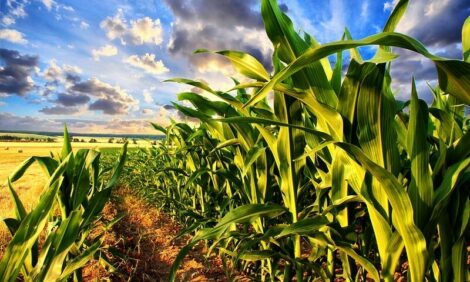



Brazil's Limited Corn Supply Challenges Poultry, Pork Sectors
BRAZIL - A significantly lower than anticipated supply of corn (maize) continues to drive an increase in Brazil's domestic corn prices in 2016, according to a recent report from the US Department of Agriculture's Foreign Agricultural Service.A devalued currency incentivised producers to export remaining stocks of corn, coupled with an early start to the dry season, is severely limiting available domestic supplies.
Brazilian corn exports are up 138 per cent from 2015. As a result, domestic prices increased up to 53.38 Reais (USD15.38) per 60kg bags, suggesting a port price of an estimated USD250 per ton. Stocks are estimated at a low 5.9 million metric tons (mmt), prompting buyers to seek foreign imports.
Consequently, poultry and pork producers are struggling to maintain operations due to inflated feed prices, the report said.
Whilst the second “safrinha” corn crop is likely to bring some relief, the report suggests it will take a whole year's corn crops to bring recovery, and weather conditions are still challenging.
Poultry and pork production down
The poultry and pork industry are confronting great challenges due to rising corn prices as feed accounts for roughly 70 per cent of production costs.
Despite an initial increase in poultry production at the start of 2016, total Brazilian chicken output decreased by 10 per cent over the past three months, according to the Brazil Animal Protein Association.
The Brazilian National Pork Producers Association reportedly reduced insemination of pigs by 15 per cent to roll back costs.
This reduction in processing capacity reduced Brazilian monthly meat production by 225,000 tons. Plants across Brazil responded to the increased input costs by cutting work shifts, enforcing mandatory vacation for employees, shutting down operations, and even prematurely slaughtering animals they are unable to continue feeding.
Producers look to exports to aid business survival
Minimum poultry and pork production costs, which encompass primarily feed and energy expenses, increased on average by 50 per cent in the first half of 2016. Meanwhile, producers continue to face persistent tighter profit margins.
Like corn, the poultry and pork sector benefited from a strong dollar on exports. Producers have turned their glance outwards to survive this time of tight margins.
Poultry exports reportedly rose 15.48 per cent in 2016, with major shipments to Russia and Saudi Arabia. Pork exports rose 69.8 per cent in 2016, with major shipments to Russia and Hong Kong.
Government attempts to decrease corn costs largely unsuccessful so far
The Brazilian government sought to intervene in the corn industry to mitigate domestic costs.
To relieve pressure on poultry and pork producers, the Brazilian government released nearly one million metric tons (mmt) of public stocks in May, but this did not provide substantial relief.
In April 2016, the federal government considered levying a 2.8 per cent export tax on corn and soybeans as a means to bolster revenue and encourage domestic sales. The tax was seen as widely regressive and was met with much resistance from industry players.
State-led policies, like the temporary waiver of the inter-state (ICMS) tax, also attempted to limit international exports but were unsuccessful.
Producers continue to seek a solution that acknowledges the objectives of both the corn and poultry and pork industries and the state. Policies are expected to be dynamic as the producers seek to abate the situation.
Producers alternatively sought to import corn feed from international sources. The Brazilian government is playing an instrumental role in reducing barriers to trade and has attempted to mollify the domestic issues related to corn supply.
While many producers are finding economic relief from Paraguay and Argentina, neither country has sufficient corn to export large volumes to Brazil for an extended period of time.
This season, Brazilian corn imports are expected to reach 1.5 mmt, five times more than total imports in 2015.
Some biotechnology used in US corn production are not approved in Brazil, limiting the scope for increased imports of cheap corn from that source in the short term. Despite this, the new Brazilian Agricultural Minister, Blairo Maggi, has indicated willingness to find a new trade relationship with the US, the report said.
Producers moves to bread wheat to affect flour prices
Producers are seeking alternatives to corn feed with limited success. Brazilian producers have traditionally used low-quality feed wheat in instances of a bad wheat crop. However, strong export prices have also prompted wheat producers to increase exports of lower quality feed wheat.
Three producers from the South of Brazil have reportedly resorted to feeding chickens and pigs higher-quality grains normally used for human consumption in breads or cookies.
Sources estimate that the meat industry has purchased 220,000 tons of bread-quality wheat since May 2016 for feed. If this pattern of human grade wheat consumption for animal use expands, flour prices will also rise.
Brazilian consumers start to feel increased costs
Producers have resorted to raising domestic prices for poultry and pork twice in 2016 to offset feed costs, subsequently threatening the demand for domestic consumption.
Consumers will have to face increased costs due to the severe economic recession that is forecasted to continue for the next two years. Negative GDP growth, rising unemployment, growing inflation, and a weakened currency are only a few factors that signal the Brazilian economic recession.
Brazilian consumers may turn to cheaper cuts of retail meat or increase consumption of staples like rice and beans. Alternatively, Brazilians could dedicate a greater proportion of income to the purchase of meat while cutting back on other discretionary spending.
Citizens reliant on governmental aid will particularly feel the negative repercussions of food prices.











